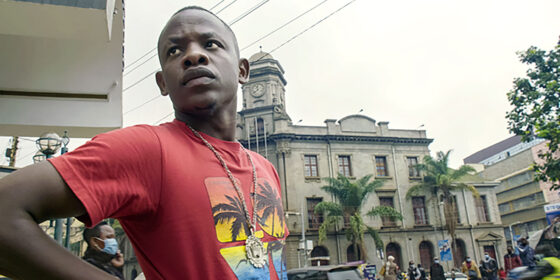TIFF 2022 | Free Money (Lauren DeFilippo & Sam Soko, Kenya/US) — TIFF Docs

By Sofia Majstorovic
“I never asked them to come here,”proffers Jael, a young woman from the Kenyan village of Kogutu, who quite literally becomes the child left behind in Sam Soko and Laren DeFilippo’s sprawling documentary Free Money. The clerical error that bends Jael’s fate over the course of four years of filming tacitly substantiates Soko and DeFilippo’s skepticism towards GiveDirectly, the NGO founded by henley-clad and bushy-tailed Michael Faye. As Faye wanders into feats of televised enthusiasm to prove that his version of Universal Basic Income (UBI) will alleviate global poverty through direct financial empowerment, a number of figureheads, most notably Larry Oduwu of the BBC, patiently break down the well-dressed evil that comfortably dabbles in the realm of human experiment.
Free Money is at its best when accenting non-verbal cues from its subjects as they explain themselves. When Faye goes to great lengths to deny that GiveDirectly is in any way an experiment, the camera zooms in on his pale hands, clumsy and keyed up at the intrusion of criticism. At another GiveDirectly staff meeting, a Kenyan fieldworker for the organization wades into a number of the challenges she has faced on the ground implementing the program’s census; here the filmmakers sneakily reveal the boredom in the boardroom: eyes glazing over and pens twiddling as discussions take on a tenor other than excitement and self-congratulation.
There are but two exposures of the directors’ obvious involvement in the filmmaking process. At one point near Free Money’s conclusion, you hear DeFilippo inquire into what happened with Jael’s case to disqualify her from the $22/month of aid; at another, there is the cheeky insertion of a clapperboard—the tried-and-true (albeit ham-fisted and silly) evidence of a documentary’s construction. Free Money is absolutely above the cleanliness of intent that classifies streaming documentaries of late, from celebrity puff-pieces to true-crime nonsense. Soko and DeFilippo excel at complication, even hinting at the film’s closure the way the community itself might pervert its stipend via a “merry-go-round fund” that most certainly resembles a pyramid scheme. However, their relationship to their subject matter remains unclear; what might it feel like as a filmmaker to talk to a single screwed-over person like Jael for four years knowing that it would be no skin off your back to just hand her $100 and resolve a year of suffering? This is the rather obvious sort of ethical and authorial question lost in the slick presentation of information suffocating today’s world of documentary filmmaking.
Sofia Majstorovic

